Understanding and Managing People in Organisations: A Tesco Analysis
VerifiedAdded on 2023/01/04
|12
|2492
|99
Report
AI Summary
This report delves into the intricacies of organizational behaviour, examining key concepts and theories within the context of Tesco plc. It explores the impacts of organizational culture, politics, and power dynamics on employee behaviour, using Handy's model of firm culture to illustrate different cultural types. The report then investigates various motivational theories, including extrinsic and intrinsic motivation, as well as content theories like Maslow's hierarchy of needs. Furthermore, it contrasts effective and ineffective teams, referencing Belbin's team roles and Tuckman's stages of group development. Finally, the report examines the path-goal theory of leadership and its implications for employee characteristics, task design, and leadership styles, offering a comprehensive analysis of managing people in organisations. The report aims to provide a detailed overview of organisational behaviour principles and their practical applications.
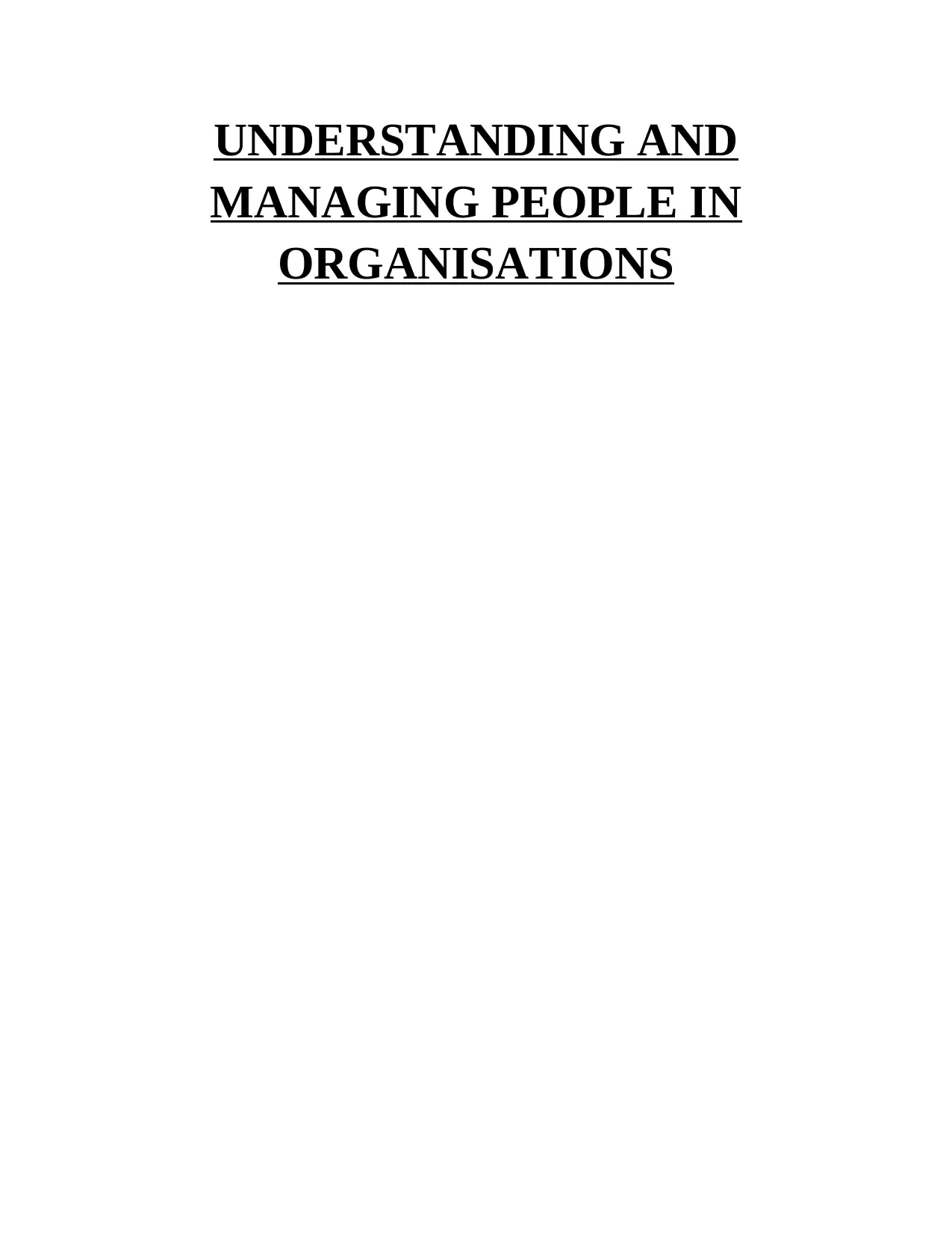
UNDERSTANDING AND
MANAGING PEOPLE IN
ORGANISATIONS
MANAGING PEOPLE IN
ORGANISATIONS
Paraphrase This Document
Need a fresh take? Get an instant paraphrase of this document with our AI Paraphraser
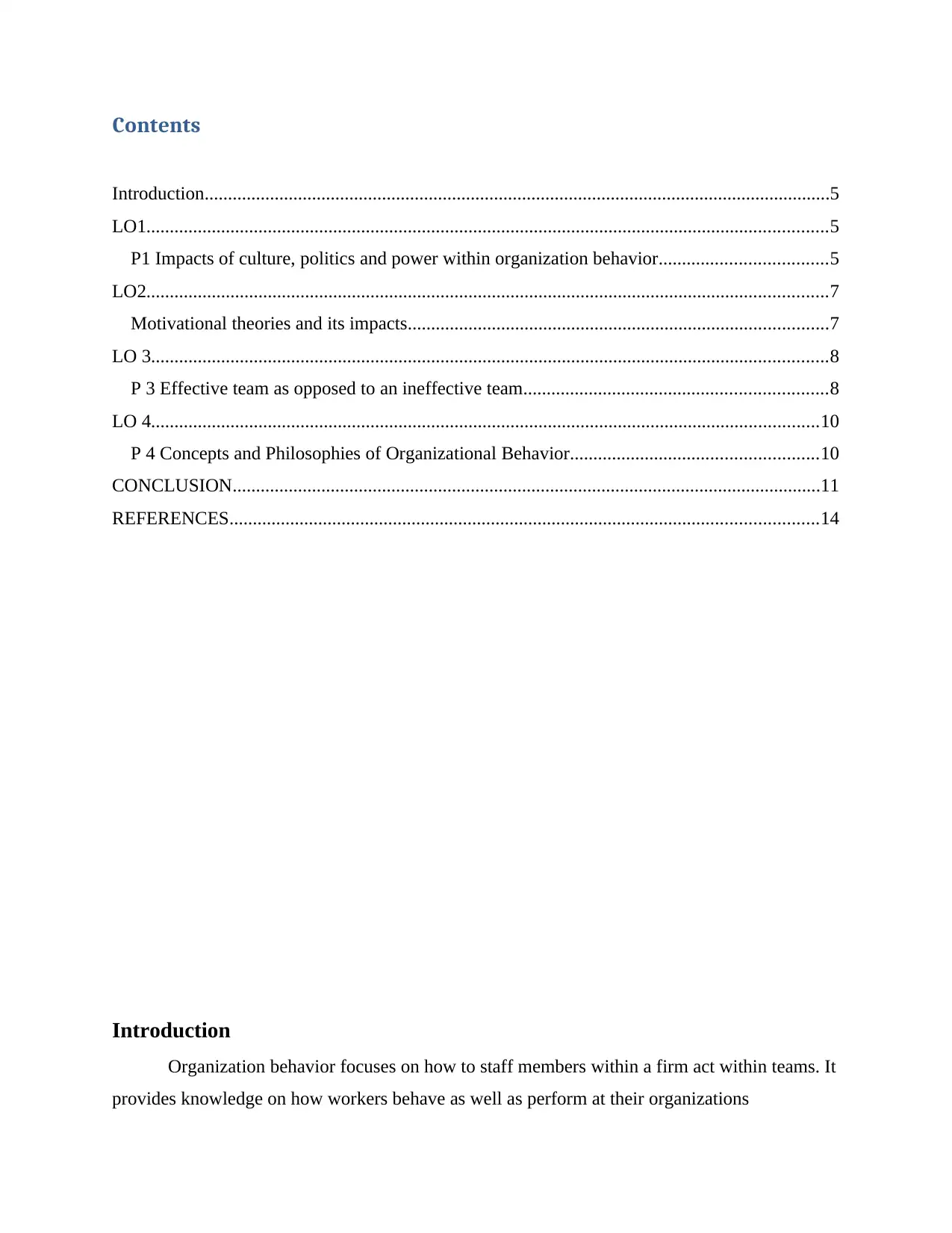
Contents
Introduction......................................................................................................................................5
LO1..................................................................................................................................................5
P1 Impacts of culture, politics and power within organization behavior....................................5
LO2..................................................................................................................................................7
Motivational theories and its impacts..........................................................................................7
LO 3.................................................................................................................................................8
P 3 Effective team as opposed to an ineffective team.................................................................8
LO 4...............................................................................................................................................10
P 4 Concepts and Philosophies of Organizational Behavior.....................................................10
CONCLUSION..............................................................................................................................11
REFERENCES..............................................................................................................................14
Introduction
Organization behavior focuses on how to staff members within a firm act within teams. It
provides knowledge on how workers behave as well as perform at their organizations
Introduction......................................................................................................................................5
LO1..................................................................................................................................................5
P1 Impacts of culture, politics and power within organization behavior....................................5
LO2..................................................................................................................................................7
Motivational theories and its impacts..........................................................................................7
LO 3.................................................................................................................................................8
P 3 Effective team as opposed to an ineffective team.................................................................8
LO 4...............................................................................................................................................10
P 4 Concepts and Philosophies of Organizational Behavior.....................................................10
CONCLUSION..............................................................................................................................11
REFERENCES..............................................................................................................................14
Introduction
Organization behavior focuses on how to staff members within a firm act within teams. It
provides knowledge on how workers behave as well as perform at their organizations
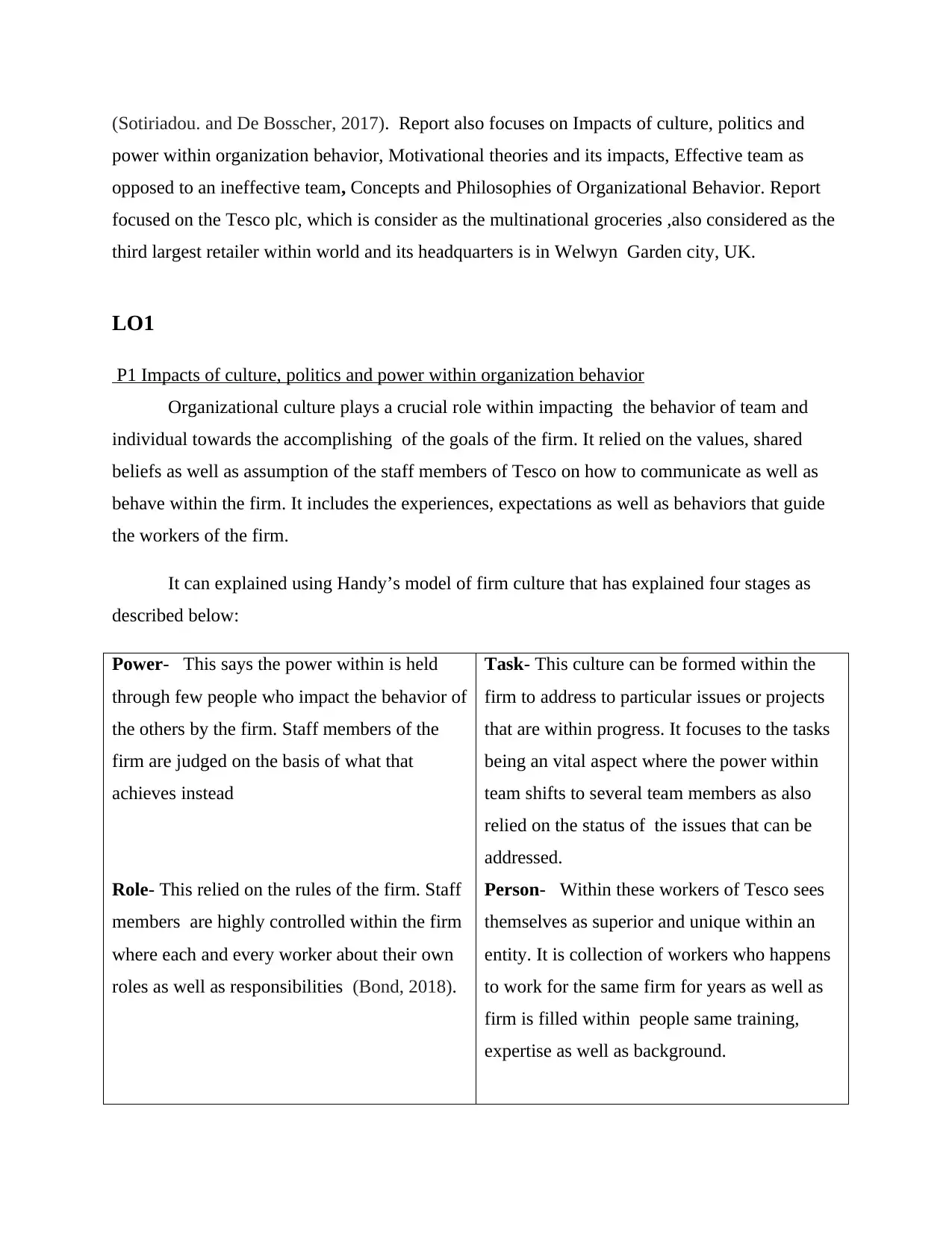
(Sotiriadou. and De Bosscher, 2017). Report also focuses on Impacts of culture, politics and
power within organization behavior, Motivational theories and its impacts, Effective team as
opposed to an ineffective team, Concepts and Philosophies of Organizational Behavior. Report
focused on the Tesco plc, which is consider as the multinational groceries ,also considered as the
third largest retailer within world and its headquarters is in Welwyn Garden city, UK.
LO1
P1 Impacts of culture, politics and power within organization behavior
Organizational culture plays a crucial role within impacting the behavior of team and
individual towards the accomplishing of the goals of the firm. It relied on the values, shared
beliefs as well as assumption of the staff members of Tesco on how to communicate as well as
behave within the firm. It includes the experiences, expectations as well as behaviors that guide
the workers of the firm.
It can explained using Handy’s model of firm culture that has explained four stages as
described below:
Power- This says the power within is held
through few people who impact the behavior of
the others by the firm. Staff members of the
firm are judged on the basis of what that
achieves instead
Role- This relied on the rules of the firm. Staff
members are highly controlled within the firm
where each and every worker about their own
roles as well as responsibilities (Bond, 2018).
Task- This culture can be formed within the
firm to address to particular issues or projects
that are within progress. It focuses to the tasks
being an vital aspect where the power within
team shifts to several team members as also
relied on the status of the issues that can be
addressed.
Person- Within these workers of Tesco sees
themselves as superior and unique within an
entity. It is collection of workers who happens
to work for the same firm for years as well as
firm is filled within people same training,
expertise as well as background.
power within organization behavior, Motivational theories and its impacts, Effective team as
opposed to an ineffective team, Concepts and Philosophies of Organizational Behavior. Report
focused on the Tesco plc, which is consider as the multinational groceries ,also considered as the
third largest retailer within world and its headquarters is in Welwyn Garden city, UK.
LO1
P1 Impacts of culture, politics and power within organization behavior
Organizational culture plays a crucial role within impacting the behavior of team and
individual towards the accomplishing of the goals of the firm. It relied on the values, shared
beliefs as well as assumption of the staff members of Tesco on how to communicate as well as
behave within the firm. It includes the experiences, expectations as well as behaviors that guide
the workers of the firm.
It can explained using Handy’s model of firm culture that has explained four stages as
described below:
Power- This says the power within is held
through few people who impact the behavior of
the others by the firm. Staff members of the
firm are judged on the basis of what that
achieves instead
Role- This relied on the rules of the firm. Staff
members are highly controlled within the firm
where each and every worker about their own
roles as well as responsibilities (Bond, 2018).
Task- This culture can be formed within the
firm to address to particular issues or projects
that are within progress. It focuses to the tasks
being an vital aspect where the power within
team shifts to several team members as also
relied on the status of the issues that can be
addressed.
Person- Within these workers of Tesco sees
themselves as superior and unique within an
entity. It is collection of workers who happens
to work for the same firm for years as well as
firm is filled within people same training,
expertise as well as background.
⊘ This is a preview!⊘
Do you want full access?
Subscribe today to unlock all pages.

Trusted by 1+ million students worldwide
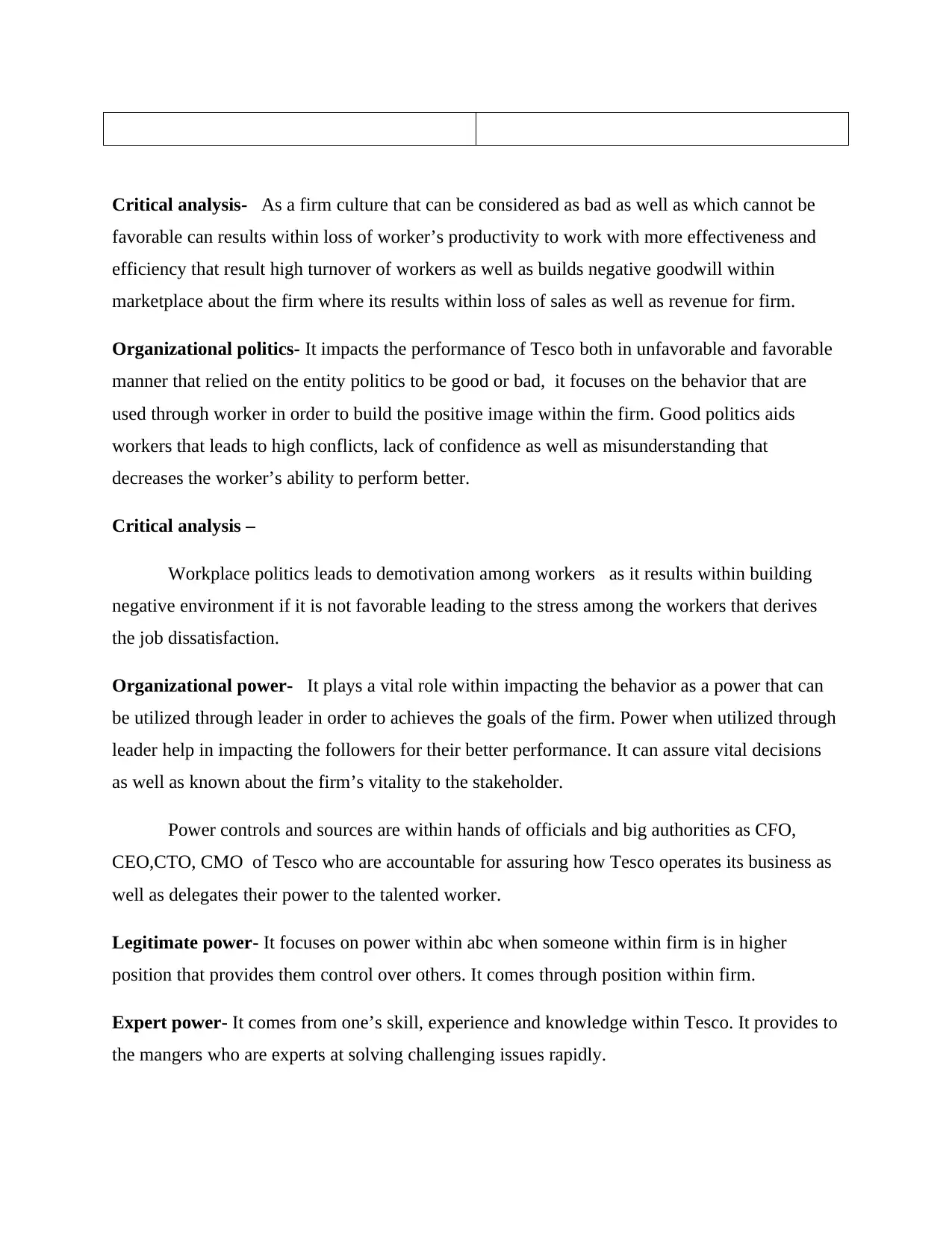
Critical analysis- As a firm culture that can be considered as bad as well as which cannot be
favorable can results within loss of worker’s productivity to work with more effectiveness and
efficiency that result high turnover of workers as well as builds negative goodwill within
marketplace about the firm where its results within loss of sales as well as revenue for firm.
Organizational politics- It impacts the performance of Tesco both in unfavorable and favorable
manner that relied on the entity politics to be good or bad, it focuses on the behavior that are
used through worker in order to build the positive image within the firm. Good politics aids
workers that leads to high conflicts, lack of confidence as well as misunderstanding that
decreases the worker’s ability to perform better.
Critical analysis –
Workplace politics leads to demotivation among workers as it results within building
negative environment if it is not favorable leading to the stress among the workers that derives
the job dissatisfaction.
Organizational power- It plays a vital role within impacting the behavior as a power that can
be utilized through leader in order to achieves the goals of the firm. Power when utilized through
leader help in impacting the followers for their better performance. It can assure vital decisions
as well as known about the firm’s vitality to the stakeholder.
Power controls and sources are within hands of officials and big authorities as CFO,
CEO,CTO, CMO of Tesco who are accountable for assuring how Tesco operates its business as
well as delegates their power to the talented worker.
Legitimate power- It focuses on power within abc when someone within firm is in higher
position that provides them control over others. It comes through position within firm.
Expert power- It comes from one’s skill, experience and knowledge within Tesco. It provides to
the mangers who are experts at solving challenging issues rapidly.
favorable can results within loss of worker’s productivity to work with more effectiveness and
efficiency that result high turnover of workers as well as builds negative goodwill within
marketplace about the firm where its results within loss of sales as well as revenue for firm.
Organizational politics- It impacts the performance of Tesco both in unfavorable and favorable
manner that relied on the entity politics to be good or bad, it focuses on the behavior that are
used through worker in order to build the positive image within the firm. Good politics aids
workers that leads to high conflicts, lack of confidence as well as misunderstanding that
decreases the worker’s ability to perform better.
Critical analysis –
Workplace politics leads to demotivation among workers as it results within building
negative environment if it is not favorable leading to the stress among the workers that derives
the job dissatisfaction.
Organizational power- It plays a vital role within impacting the behavior as a power that can
be utilized through leader in order to achieves the goals of the firm. Power when utilized through
leader help in impacting the followers for their better performance. It can assure vital decisions
as well as known about the firm’s vitality to the stakeholder.
Power controls and sources are within hands of officials and big authorities as CFO,
CEO,CTO, CMO of Tesco who are accountable for assuring how Tesco operates its business as
well as delegates their power to the talented worker.
Legitimate power- It focuses on power within abc when someone within firm is in higher
position that provides them control over others. It comes through position within firm.
Expert power- It comes from one’s skill, experience and knowledge within Tesco. It provides to
the mangers who are experts at solving challenging issues rapidly.
Paraphrase This Document
Need a fresh take? Get an instant paraphrase of this document with our AI Paraphraser
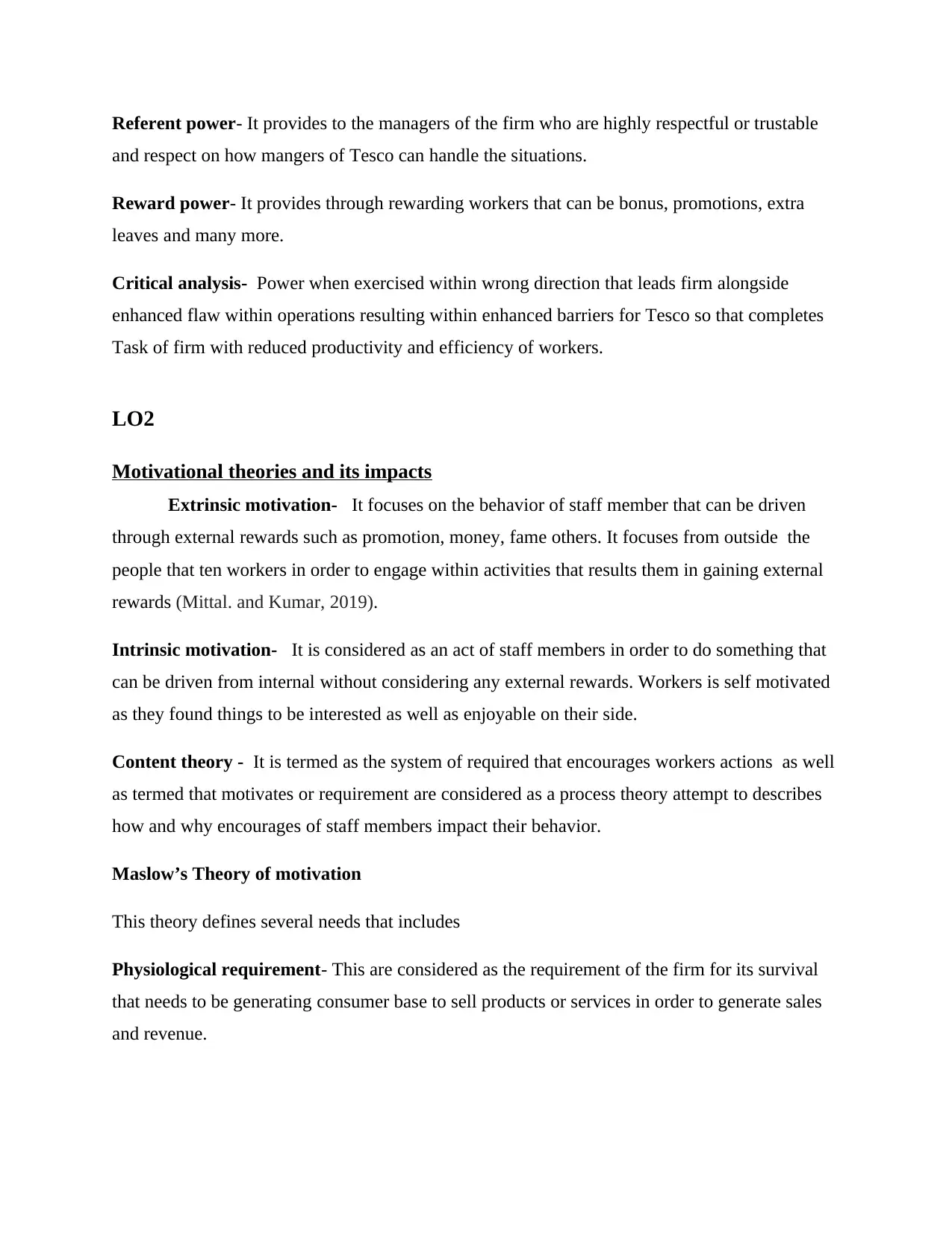
Referent power- It provides to the managers of the firm who are highly respectful or trustable
and respect on how mangers of Tesco can handle the situations.
Reward power- It provides through rewarding workers that can be bonus, promotions, extra
leaves and many more.
Critical analysis- Power when exercised within wrong direction that leads firm alongside
enhanced flaw within operations resulting within enhanced barriers for Tesco so that completes
Task of firm with reduced productivity and efficiency of workers.
LO2
Motivational theories and its impacts
Extrinsic motivation- It focuses on the behavior of staff member that can be driven
through external rewards such as promotion, money, fame others. It focuses from outside the
people that ten workers in order to engage within activities that results them in gaining external
rewards (Mittal. and Kumar, 2019).
Intrinsic motivation- It is considered as an act of staff members in order to do something that
can be driven from internal without considering any external rewards. Workers is self motivated
as they found things to be interested as well as enjoyable on their side.
Content theory - It is termed as the system of required that encourages workers actions as well
as termed that motivates or requirement are considered as a process theory attempt to describes
how and why encourages of staff members impact their behavior.
Maslow’s Theory of motivation
This theory defines several needs that includes
Physiological requirement- This are considered as the requirement of the firm for its survival
that needs to be generating consumer base to sell products or services in order to generate sales
and revenue.
and respect on how mangers of Tesco can handle the situations.
Reward power- It provides through rewarding workers that can be bonus, promotions, extra
leaves and many more.
Critical analysis- Power when exercised within wrong direction that leads firm alongside
enhanced flaw within operations resulting within enhanced barriers for Tesco so that completes
Task of firm with reduced productivity and efficiency of workers.
LO2
Motivational theories and its impacts
Extrinsic motivation- It focuses on the behavior of staff member that can be driven
through external rewards such as promotion, money, fame others. It focuses from outside the
people that ten workers in order to engage within activities that results them in gaining external
rewards (Mittal. and Kumar, 2019).
Intrinsic motivation- It is considered as an act of staff members in order to do something that
can be driven from internal without considering any external rewards. Workers is self motivated
as they found things to be interested as well as enjoyable on their side.
Content theory - It is termed as the system of required that encourages workers actions as well
as termed that motivates or requirement are considered as a process theory attempt to describes
how and why encourages of staff members impact their behavior.
Maslow’s Theory of motivation
This theory defines several needs that includes
Physiological requirement- This are considered as the requirement of the firm for its survival
that needs to be generating consumer base to sell products or services in order to generate sales
and revenue.
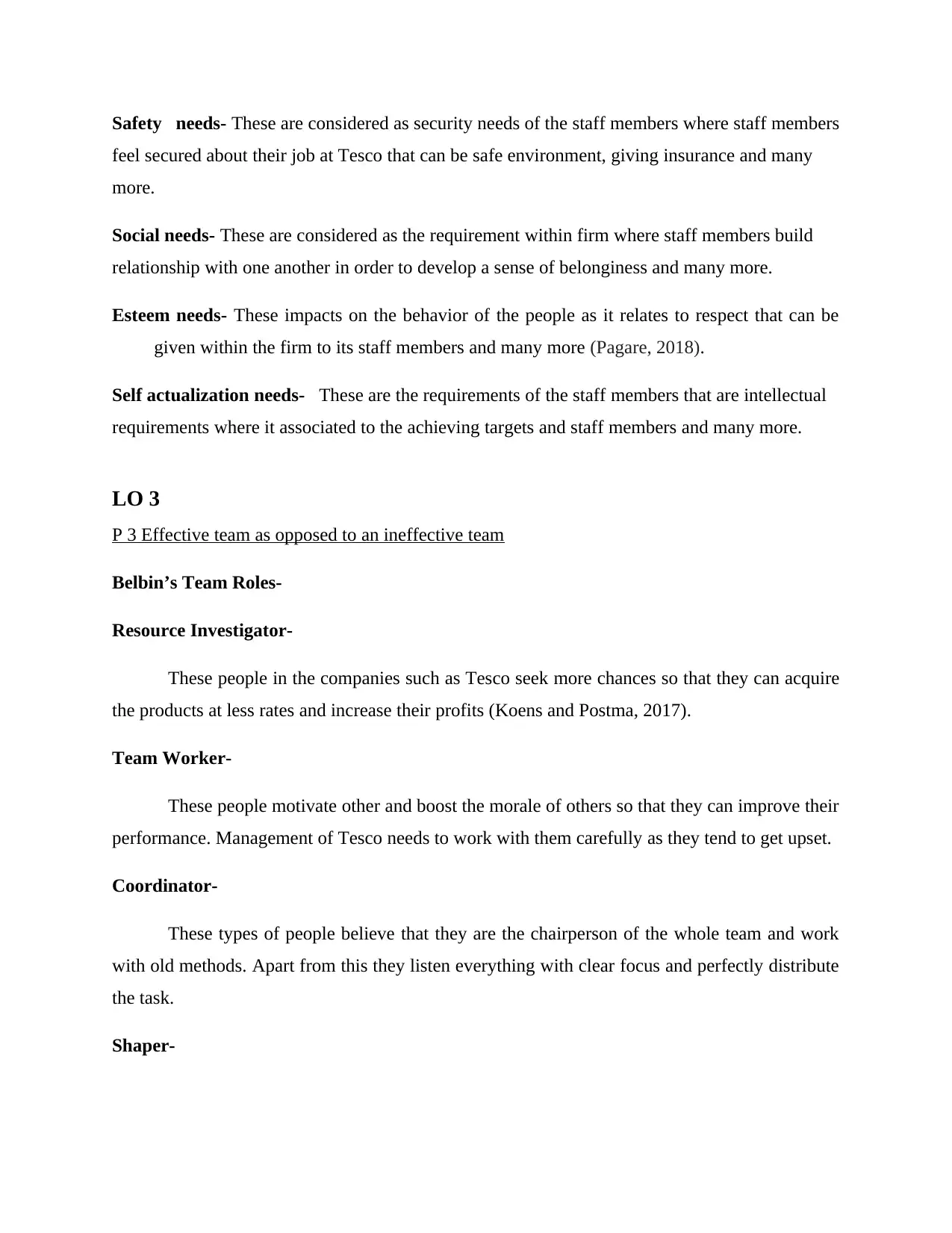
Safety needs- These are considered as security needs of the staff members where staff members
feel secured about their job at Tesco that can be safe environment, giving insurance and many
more.
Social needs- These are considered as the requirement within firm where staff members build
relationship with one another in order to develop a sense of belonginess and many more.
Esteem needs- These impacts on the behavior of the people as it relates to respect that can be
given within the firm to its staff members and many more (Pagare, 2018).
Self actualization needs- These are the requirements of the staff members that are intellectual
requirements where it associated to the achieving targets and staff members and many more.
LO 3
P 3 Effective team as opposed to an ineffective team
Belbin’s Team Roles-
Resource Investigator-
These people in the companies such as Tesco seek more chances so that they can acquire
the products at less rates and increase their profits (Koens and Postma, 2017).
Team Worker-
These people motivate other and boost the morale of others so that they can improve their
performance. Management of Tesco needs to work with them carefully as they tend to get upset.
Coordinator-
These types of people believe that they are the chairperson of the whole team and work
with old methods. Apart from this they listen everything with clear focus and perfectly distribute
the task.
Shaper-
feel secured about their job at Tesco that can be safe environment, giving insurance and many
more.
Social needs- These are considered as the requirement within firm where staff members build
relationship with one another in order to develop a sense of belonginess and many more.
Esteem needs- These impacts on the behavior of the people as it relates to respect that can be
given within the firm to its staff members and many more (Pagare, 2018).
Self actualization needs- These are the requirements of the staff members that are intellectual
requirements where it associated to the achieving targets and staff members and many more.
LO 3
P 3 Effective team as opposed to an ineffective team
Belbin’s Team Roles-
Resource Investigator-
These people in the companies such as Tesco seek more chances so that they can acquire
the products at less rates and increase their profits (Koens and Postma, 2017).
Team Worker-
These people motivate other and boost the morale of others so that they can improve their
performance. Management of Tesco needs to work with them carefully as they tend to get upset.
Coordinator-
These types of people believe that they are the chairperson of the whole team and work
with old methods. Apart from this they listen everything with clear focus and perfectly distribute
the task.
Shaper-
⊘ This is a preview!⊘
Do you want full access?
Subscribe today to unlock all pages.

Trusted by 1+ million students worldwide
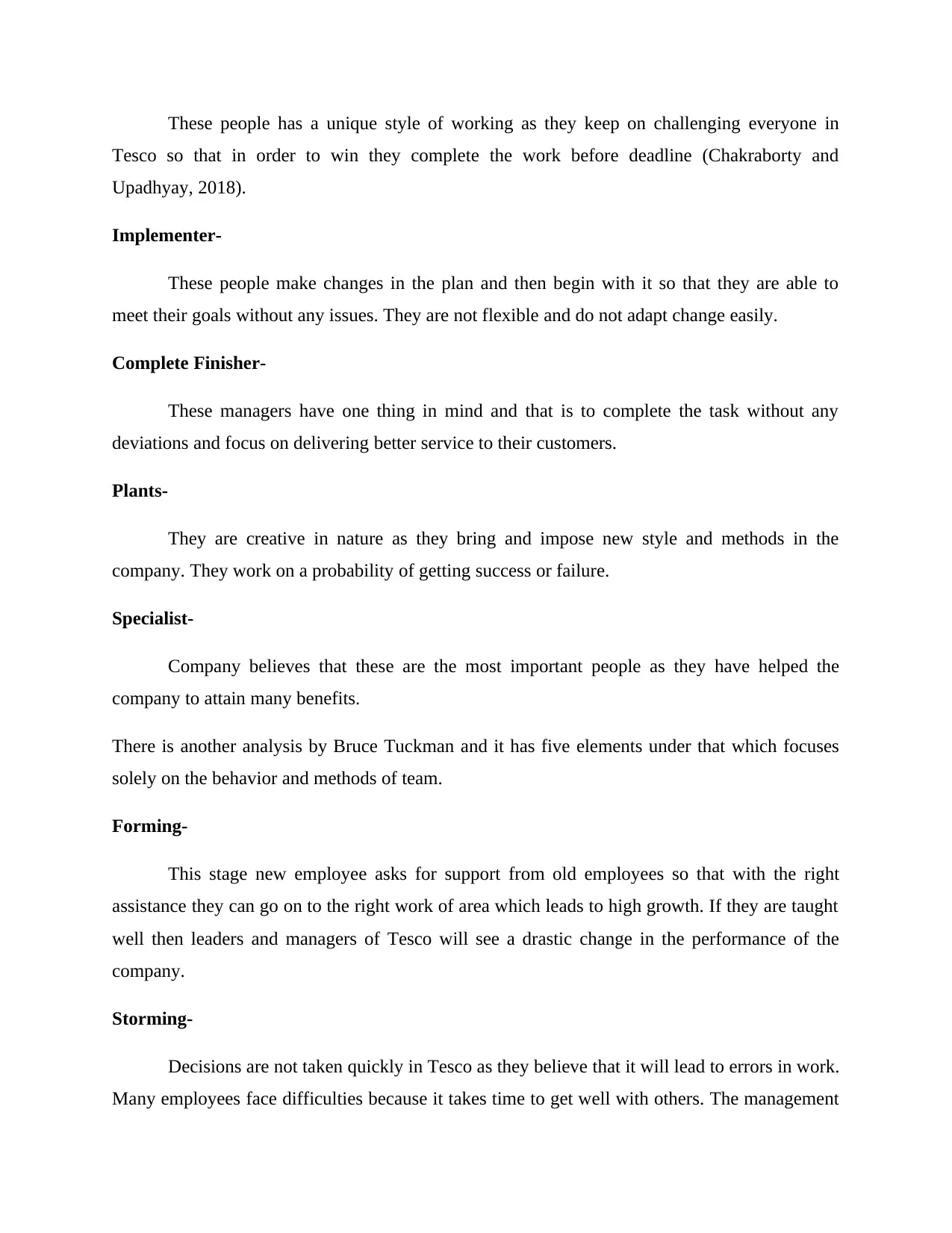
These people has a unique style of working as they keep on challenging everyone in
Tesco so that in order to win they complete the work before deadline (Chakraborty and
Upadhyay, 2018).
Implementer-
These people make changes in the plan and then begin with it so that they are able to
meet their goals without any issues. They are not flexible and do not adapt change easily.
Complete Finisher-
These managers have one thing in mind and that is to complete the task without any
deviations and focus on delivering better service to their customers.
Plants-
They are creative in nature as they bring and impose new style and methods in the
company. They work on a probability of getting success or failure.
Specialist-
Company believes that these are the most important people as they have helped the
company to attain many benefits.
There is another analysis by Bruce Tuckman and it has five elements under that which focuses
solely on the behavior and methods of team.
Forming-
This stage new employee asks for support from old employees so that with the right
assistance they can go on to the right work of area which leads to high growth. If they are taught
well then leaders and managers of Tesco will see a drastic change in the performance of the
company.
Storming-
Decisions are not taken quickly in Tesco as they believe that it will lead to errors in work.
Many employees face difficulties because it takes time to get well with others. The management
Tesco so that in order to win they complete the work before deadline (Chakraborty and
Upadhyay, 2018).
Implementer-
These people make changes in the plan and then begin with it so that they are able to
meet their goals without any issues. They are not flexible and do not adapt change easily.
Complete Finisher-
These managers have one thing in mind and that is to complete the task without any
deviations and focus on delivering better service to their customers.
Plants-
They are creative in nature as they bring and impose new style and methods in the
company. They work on a probability of getting success or failure.
Specialist-
Company believes that these are the most important people as they have helped the
company to attain many benefits.
There is another analysis by Bruce Tuckman and it has five elements under that which focuses
solely on the behavior and methods of team.
Forming-
This stage new employee asks for support from old employees so that with the right
assistance they can go on to the right work of area which leads to high growth. If they are taught
well then leaders and managers of Tesco will see a drastic change in the performance of the
company.
Storming-
Decisions are not taken quickly in Tesco as they believe that it will lead to errors in work.
Many employees face difficulties because it takes time to get well with others. The management
Paraphrase This Document
Need a fresh take? Get an instant paraphrase of this document with our AI Paraphraser
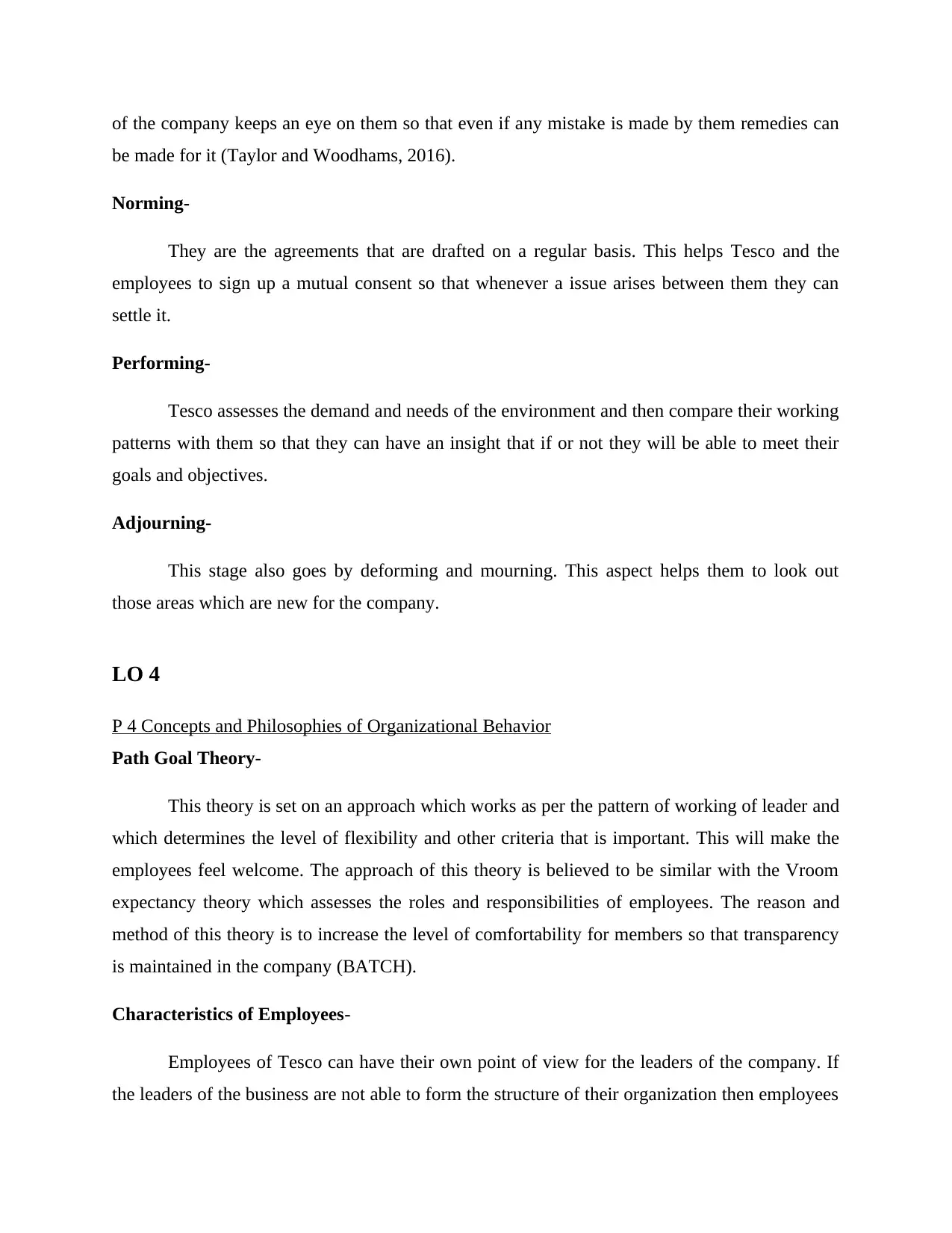
of the company keeps an eye on them so that even if any mistake is made by them remedies can
be made for it (Taylor and Woodhams, 2016).
Norming-
They are the agreements that are drafted on a regular basis. This helps Tesco and the
employees to sign up a mutual consent so that whenever a issue arises between them they can
settle it.
Performing-
Tesco assesses the demand and needs of the environment and then compare their working
patterns with them so that they can have an insight that if or not they will be able to meet their
goals and objectives.
Adjourning-
This stage also goes by deforming and mourning. This aspect helps them to look out
those areas which are new for the company.
LO 4
P 4 Concepts and Philosophies of Organizational Behavior
Path Goal Theory-
This theory is set on an approach which works as per the pattern of working of leader and
which determines the level of flexibility and other criteria that is important. This will make the
employees feel welcome. The approach of this theory is believed to be similar with the Vroom
expectancy theory which assesses the roles and responsibilities of employees. The reason and
method of this theory is to increase the level of comfortability for members so that transparency
is maintained in the company (BATCH).
Characteristics of Employees-
Employees of Tesco can have their own point of view for the leaders of the company. If
the leaders of the business are not able to form the structure of their organization then employees
be made for it (Taylor and Woodhams, 2016).
Norming-
They are the agreements that are drafted on a regular basis. This helps Tesco and the
employees to sign up a mutual consent so that whenever a issue arises between them they can
settle it.
Performing-
Tesco assesses the demand and needs of the environment and then compare their working
patterns with them so that they can have an insight that if or not they will be able to meet their
goals and objectives.
Adjourning-
This stage also goes by deforming and mourning. This aspect helps them to look out
those areas which are new for the company.
LO 4
P 4 Concepts and Philosophies of Organizational Behavior
Path Goal Theory-
This theory is set on an approach which works as per the pattern of working of leader and
which determines the level of flexibility and other criteria that is important. This will make the
employees feel welcome. The approach of this theory is believed to be similar with the Vroom
expectancy theory which assesses the roles and responsibilities of employees. The reason and
method of this theory is to increase the level of comfortability for members so that transparency
is maintained in the company (BATCH).
Characteristics of Employees-
Employees of Tesco can have their own point of view for the leaders of the company. If
the leaders of the business are not able to form the structure of their organization then employees
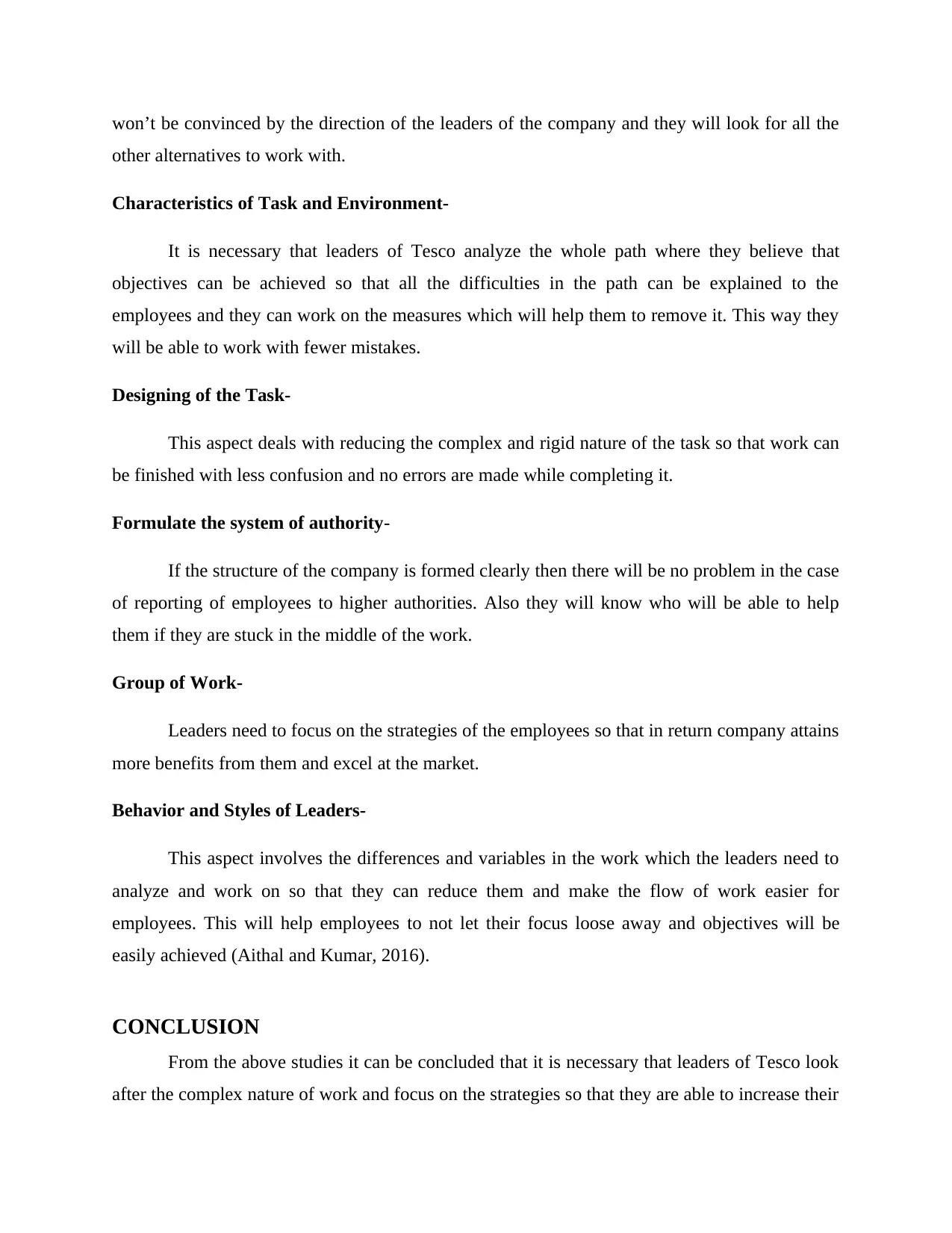
won’t be convinced by the direction of the leaders of the company and they will look for all the
other alternatives to work with.
Characteristics of Task and Environment-
It is necessary that leaders of Tesco analyze the whole path where they believe that
objectives can be achieved so that all the difficulties in the path can be explained to the
employees and they can work on the measures which will help them to remove it. This way they
will be able to work with fewer mistakes.
Designing of the Task-
This aspect deals with reducing the complex and rigid nature of the task so that work can
be finished with less confusion and no errors are made while completing it.
Formulate the system of authority-
If the structure of the company is formed clearly then there will be no problem in the case
of reporting of employees to higher authorities. Also they will know who will be able to help
them if they are stuck in the middle of the work.
Group of Work-
Leaders need to focus on the strategies of the employees so that in return company attains
more benefits from them and excel at the market.
Behavior and Styles of Leaders-
This aspect involves the differences and variables in the work which the leaders need to
analyze and work on so that they can reduce them and make the flow of work easier for
employees. This will help employees to not let their focus loose away and objectives will be
easily achieved (Aithal and Kumar, 2016).
CONCLUSION
From the above studies it can be concluded that it is necessary that leaders of Tesco look
after the complex nature of work and focus on the strategies so that they are able to increase their
other alternatives to work with.
Characteristics of Task and Environment-
It is necessary that leaders of Tesco analyze the whole path where they believe that
objectives can be achieved so that all the difficulties in the path can be explained to the
employees and they can work on the measures which will help them to remove it. This way they
will be able to work with fewer mistakes.
Designing of the Task-
This aspect deals with reducing the complex and rigid nature of the task so that work can
be finished with less confusion and no errors are made while completing it.
Formulate the system of authority-
If the structure of the company is formed clearly then there will be no problem in the case
of reporting of employees to higher authorities. Also they will know who will be able to help
them if they are stuck in the middle of the work.
Group of Work-
Leaders need to focus on the strategies of the employees so that in return company attains
more benefits from them and excel at the market.
Behavior and Styles of Leaders-
This aspect involves the differences and variables in the work which the leaders need to
analyze and work on so that they can reduce them and make the flow of work easier for
employees. This will help employees to not let their focus loose away and objectives will be
easily achieved (Aithal and Kumar, 2016).
CONCLUSION
From the above studies it can be concluded that it is necessary that leaders of Tesco look
after the complex nature of work and focus on the strategies so that they are able to increase their
⊘ This is a preview!⊘
Do you want full access?
Subscribe today to unlock all pages.

Trusted by 1+ million students worldwide
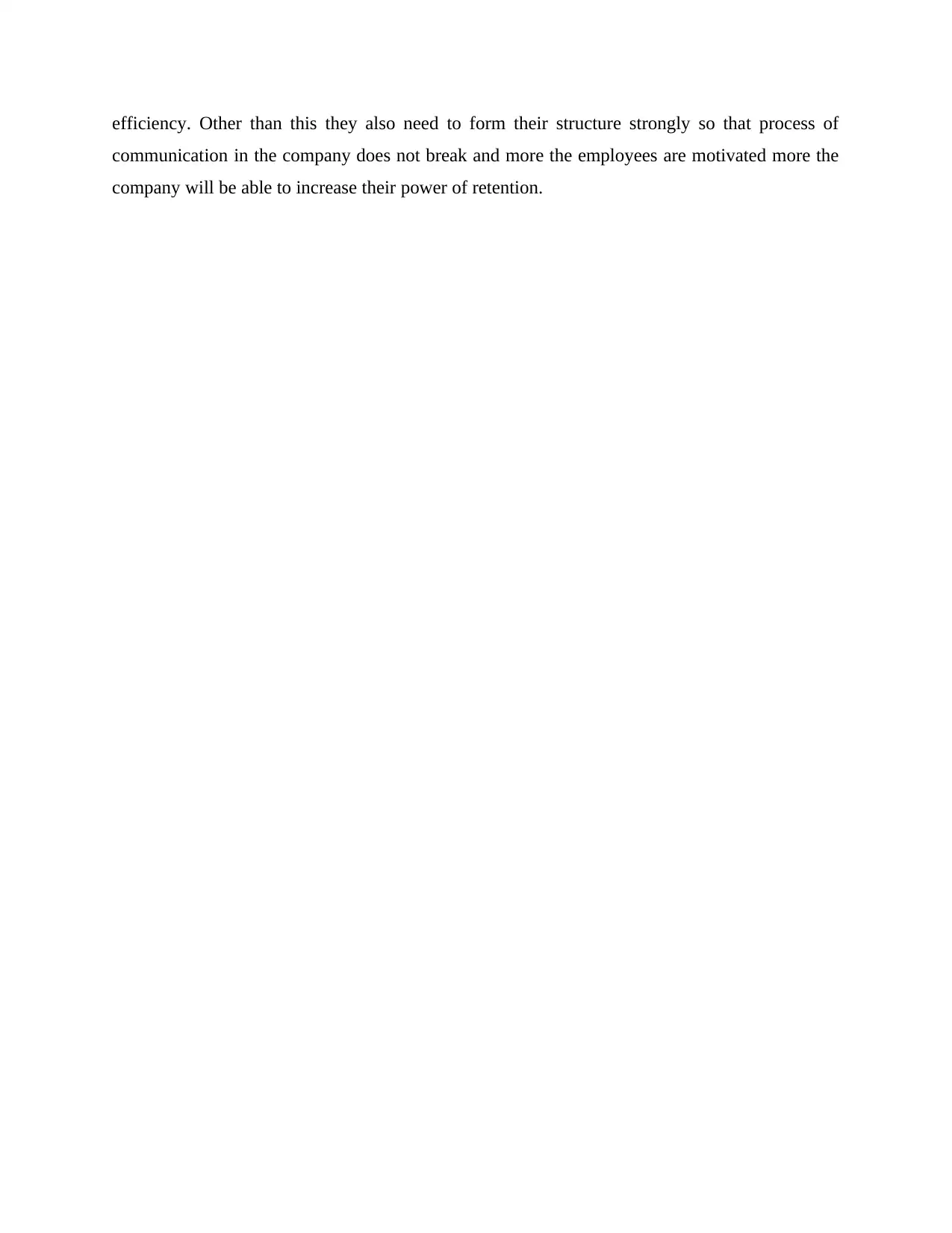
efficiency. Other than this they also need to form their structure strongly so that process of
communication in the company does not break and more the employees are motivated more the
company will be able to increase their power of retention.
communication in the company does not break and more the employees are motivated more the
company will be able to increase their power of retention.
Paraphrase This Document
Need a fresh take? Get an instant paraphrase of this document with our AI Paraphraser

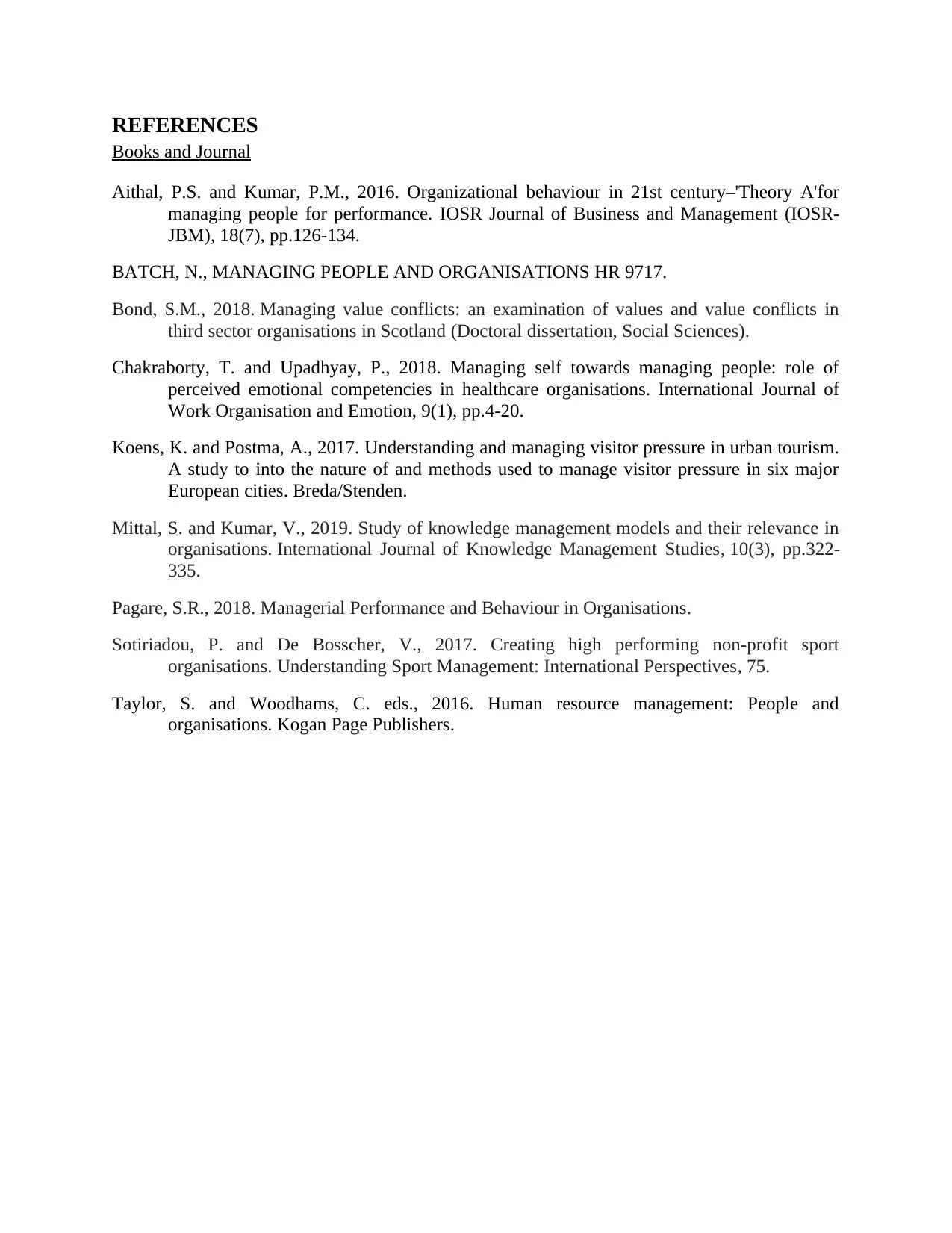
REFERENCES
Books and Journal
Aithal, P.S. and Kumar, P.M., 2016. Organizational behaviour in 21st century–'Theory A'for
managing people for performance. IOSR Journal of Business and Management (IOSR-
JBM), 18(7), pp.126-134.
BATCH, N., MANAGING PEOPLE AND ORGANISATIONS HR 9717.
Bond, S.M., 2018. Managing value conflicts: an examination of values and value conflicts in
third sector organisations in Scotland (Doctoral dissertation, Social Sciences).
Chakraborty, T. and Upadhyay, P., 2018. Managing self towards managing people: role of
perceived emotional competencies in healthcare organisations. International Journal of
Work Organisation and Emotion, 9(1), pp.4-20.
Koens, K. and Postma, A., 2017. Understanding and managing visitor pressure in urban tourism.
A study to into the nature of and methods used to manage visitor pressure in six major
European cities. Breda/Stenden.
Mittal, S. and Kumar, V., 2019. Study of knowledge management models and their relevance in
organisations. International Journal of Knowledge Management Studies, 10(3), pp.322-
335.
Pagare, S.R., 2018. Managerial Performance and Behaviour in Organisations.
Sotiriadou, P. and De Bosscher, V., 2017. Creating high performing non-profit sport
organisations. Understanding Sport Management: International Perspectives, 75.
Taylor, S. and Woodhams, C. eds., 2016. Human resource management: People and
organisations. Kogan Page Publishers.
Books and Journal
Aithal, P.S. and Kumar, P.M., 2016. Organizational behaviour in 21st century–'Theory A'for
managing people for performance. IOSR Journal of Business and Management (IOSR-
JBM), 18(7), pp.126-134.
BATCH, N., MANAGING PEOPLE AND ORGANISATIONS HR 9717.
Bond, S.M., 2018. Managing value conflicts: an examination of values and value conflicts in
third sector organisations in Scotland (Doctoral dissertation, Social Sciences).
Chakraborty, T. and Upadhyay, P., 2018. Managing self towards managing people: role of
perceived emotional competencies in healthcare organisations. International Journal of
Work Organisation and Emotion, 9(1), pp.4-20.
Koens, K. and Postma, A., 2017. Understanding and managing visitor pressure in urban tourism.
A study to into the nature of and methods used to manage visitor pressure in six major
European cities. Breda/Stenden.
Mittal, S. and Kumar, V., 2019. Study of knowledge management models and their relevance in
organisations. International Journal of Knowledge Management Studies, 10(3), pp.322-
335.
Pagare, S.R., 2018. Managerial Performance and Behaviour in Organisations.
Sotiriadou, P. and De Bosscher, V., 2017. Creating high performing non-profit sport
organisations. Understanding Sport Management: International Perspectives, 75.
Taylor, S. and Woodhams, C. eds., 2016. Human resource management: People and
organisations. Kogan Page Publishers.
⊘ This is a preview!⊘
Do you want full access?
Subscribe today to unlock all pages.

Trusted by 1+ million students worldwide
1 out of 12
Related Documents
Your All-in-One AI-Powered Toolkit for Academic Success.
+13062052269
info@desklib.com
Available 24*7 on WhatsApp / Email
![[object Object]](/_next/static/media/star-bottom.7253800d.svg)
Unlock your academic potential
Copyright © 2020–2025 A2Z Services. All Rights Reserved. Developed and managed by ZUCOL.





